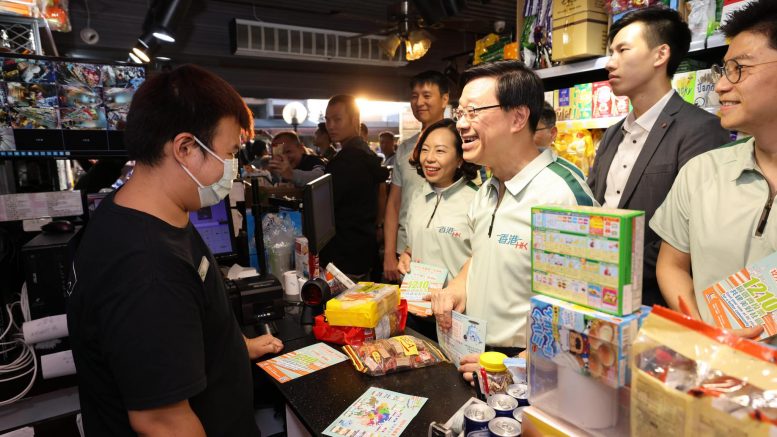By Chris Yeung —
Chief Executive John Lee put on a smiling face as he befriended citizens in a district visit on Wednesday (15/11) hours before President Xi Jinping and his US counterpart Joe Biden held a summit in San Francisco.
Lee, who was officially invited to attend the annual APEC leaders’ meeting scheduled to be convened in the West coast city one day after the Xi-Biden meeting, had cited “scheduling issues” for sending Financial Secretary Paul Chan to represent him at the summit.
What he did not say was that he was likely to be denied entry into the US for the meeting if Biden had not granted an exemption to him from an sanction order passed by the Congress after the 2019 social unrest.
Lee, who was security minister in the previous administration led by Carrie Lam, was among a list of officials being held responsible for their role in the government crackdown.
The official invitation letter given to Lee is just a piece of paper if the ban on Lee’s entry was not lifted, at least for the visit to San Francisco. And it is too small a paper to hide the embarrassing face of Lee.
That the city’s chief has emerged as the lone loser in the diplomatic wrestling between the world’s two superpowers had not caused a stir in the society. Few people would have cared whether Lee is able to join leaders at the APEC summit or will suffer the same fate of Russian President Vladimir Putin, who is on a separate sanction list.
At least one thought otherwise. Regina Ip Lau Suk-yee, the top adviser of Lee at the Executive Council, had urged in early August the Government to think seriously whether they should send a senior-ranking substitute to attend the APEC if Lee was not allowed to attend.
She went further to say Xi should also consider whether or not to join the meeting, thus condoning the humiliation of Lee being denied the right to attend the summit. Together with the likely absence of Putin, Mrs Ip was adamant the value of APEC would fall drastically if both Xi and Lee did not show up.
It is difficult to ascertain whether Beijing had given serious consideration to Mrs Ip’s idea of bundling Lee with Xi in the diplomatic game of Lee’s participation in the APEC summit. But it seemed to be a huge bet the communist leadership did not want to take.
The rest is an episode in the history of the 2023 San Francisco APEC summit Lee would like to forget.
It is, however, a lesson that Lee, his top advisers and the loyalists should learn in view of the increasingly intricate and complicated relationship between China and the US.
Confronted with a host of thorny economic and security issues, both countries apparently do not want to have another fierce fight over the Hong Kong issue.
For Biden, he has no reason to make Lee a special case at the risk of attacks from anti-China Congressmen. For Xi, he has no reason to take the risk of spoiling the opportunity of an attempt to put the troubled Sino-US relations back to normal by making a “not-one-less”, or both-or-none, demand to the US.
It is a case of political naivety if Mrs Ip genuinely believes Xi would fight for the right of Lee to attend the meeting at all cost. What Xi and the party leadership considered the best interest of the nation shall prevail.
Like it or not, the communist authorities cannot ignore the fact that their ascendancy has caused fears among neighbouring countries and the Western bloc. Playing hardball tactics and “wolf-style” fight-back propaganda helps little but, in most cases, add more fuel to the fire.
The conciliatory remarks made by Xi at the summit to reassure the world China’s goal of peaceful ascendancy may be a mere tactical retreat for a bolder step later. Only time will tell. But judging from the litany of domestic and external problems they are facing, it would only be sensible for Xi to try to moderate the tense relationship.
Beijing’s shift to reconciliation in its relations with the US contrasts oddly with the vehement anti-US attacks by officials and pro-Beijing pundits.
One notable example is the security chief’s likening as “triad-style” a move by a cross-party coalition in the US Congress to lengthen the list of sanctions of Hong Kong officials, judges and prosecutors who were involved in the national security law.
Such outbursts and perenial accusations of US forces and agents behind “colour revolution” in Hong Kong cannot possibly help the nation build the partnership and friendship that Xi has alluded to in his messages to the American people. It may be politically smart for the loyalists to toe the party line, but only if they know what the party line is.
ends


Be the first to comment on "Lee left in cold as China-US ties warm"